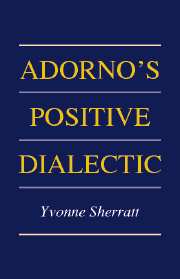Book contents
- Frontmatter
- Contents
- Preface
- Abbreviations
- Adorno's Positive Dialectic
- General Introduction
- PRELUDE TO ADORNO'S POSITIVE DIALECTIC
- Prelude I: Adorno's Intellectual Tradition: German Philosophy
- Prelude II: Adorno's Intellectual Tradition: Sigmund Freud
- ADORNO'S POSITIVE DIALECTIC: INTRODUCTION
- PART I NEGATIVE THESIS: THE DECLINE OF ENLIGHTENMENT
- PART II POSITIVE THESIS: THE REDEMPTION OF ENLIGHTENMENT
- 5 The Aesthetic: Aura
- 6 Knowledge Acquisition: An Aesthetic Form
- 7 A Positive Dialectic of Knowledge Acquisition
- 8 A Positive Dialectic of Subjectivity: The Instincts
- 9 A Positive Dialectic of Subjectivity: The Structure of The Self
- Concluding Comments
- Bibliography
- Index
8 - A Positive Dialectic of Subjectivity: The Instincts
Published online by Cambridge University Press: 10 August 2009
- Frontmatter
- Contents
- Preface
- Abbreviations
- Adorno's Positive Dialectic
- General Introduction
- PRELUDE TO ADORNO'S POSITIVE DIALECTIC
- Prelude I: Adorno's Intellectual Tradition: German Philosophy
- Prelude II: Adorno's Intellectual Tradition: Sigmund Freud
- ADORNO'S POSITIVE DIALECTIC: INTRODUCTION
- PART I NEGATIVE THESIS: THE DECLINE OF ENLIGHTENMENT
- PART II POSITIVE THESIS: THE REDEMPTION OF ENLIGHTENMENT
- 5 The Aesthetic: Aura
- 6 Knowledge Acquisition: An Aesthetic Form
- 7 A Positive Dialectic of Knowledge Acquisition
- 8 A Positive Dialectic of Subjectivity: The Instincts
- 9 A Positive Dialectic of Subjectivity: The Structure of The Self
- Concluding Comments
- Bibliography
- Index
Summary
INTRODUCTION
In this chapter we will return to address the problems raised in Chapter 1. We will view the consequences of the positive dialectic in epistemology for Subjectivity. First we show that Adorno's notion of aesthetic knowledge acquisition means that the id-instinct has a ‘cognitive’ role. Second, we argue that the id and the ego instincts are dialectically related. Third, we explore the implications of this opposition and inextricable connection by focussing initially upon the opposition between the id and ego-instincts. Fourth, we then look at the implications of the inextricable connection between the id and the ego-instincts. Finally, we show how this positive dialectic of Subjectivity redeems the narrative of regression of enlightenment depicted in Chapter 1.
INSTINCTS
Adorno in offering an aesthetic kind of knowledge acquisition differs dramatically from anything that the enlightenment would consider as knowledge. He also therefore differs from anything that Freud would accept. Adorno's view of instrumental knowledge acquisition with its features of control, discrimination and instrumental meaning clearly builds upon Freud's view of knowledge acquisition as stemming from the ego instinct. Aesthetic knowledge acquisition, however, with no capacity for control or discrimination and no ability to gain the instrumental meaning of the Object can not be derived from the ego. It would not, for Freud, be ‘cognitively’ valid at all.
Adorno, however, deploys Freud's theories in general in order to understand the foundation of knowledge acquisition in the Subject.
- Type
- Chapter
- Information
- Adorno's Positive Dialectic , pp. 209 - 223Publisher: Cambridge University PressPrint publication year: 2002



